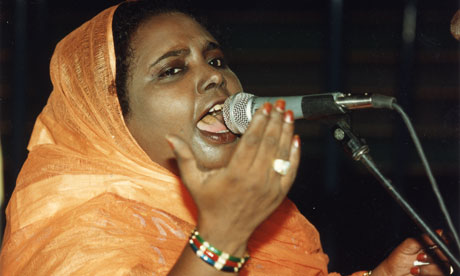
‘I enjoyed singing since the days I was aware of anything,’ Dimi Mint Abba recalled in 1989
Dimi Mint Abba, who has died from a brain haemorrhage aged 52, while touring in Morocco, was one of the finest and best-loved singers in the north-west African state of Mauritania. Known as the "diva of the desert", she recorded remarkably few albums and made only occasional visits to Europe (her last UK appearance was at the Womad festival in 2006), but built up a large following at home, and across north Africa and the Middle East, thanks to her powerful live performances. Her fans included Mali's legendary guitarist Ali Farka Touré, as well as the kora virtuoso Toumani Diabaté and the Senegalese superstar Youssou N'Dour – both of whom recently expressed a wish to work with her.
Born Loula Bint Siddaty Ould Abba, she came from a family of iggawin, Mauritanian griots, whose traditional role is to act not just as musicians, but as historians and commentators. Her parents were both distinguished musicians. Her father, Siday Ould Abba, was a singer and composer who wrote the Mauritanian national anthem, while her mother, Fire Mounina Mint Eida, was an exponent of the ardin, a 14-string relative of the west African kora.
Dimi started her musical career as a child by learning to beat a drum (percussionists in Mauritania are traditionally women) and singing with her parents. "I enjoyed singing since the days I was aware of anything," she recalled in 1989. "From childhood I accompanied my family and when I was around 10 years old, my mother taught me to play the ardin."
She became an impressive instrumentalist while still a teenager, and at the age of 16 she performed with her parents on Mauritanian radio, but decided, "I wanted to go my own way after that." In 1976 she won a singing competition, and the following year was invited to represent her country at a major festival in Tunisia. She went on to represent Mauritania at other festivals in Iraq, Algeria and Morocco.
Mauritania is one of the crossroads of Africa, with Algeria and western Sahara to the north, Senegal to the south and Mali to the east. Dimi's powerful songs blended north and west African influences, mixing Arabic scales and improvisation with echoes of west African instrumentation. It was a style that won her a following not just in north Africa but in Mali, where Touré was so impressed by her singing that he mentioned her to his British record label, World Circuit. As a result, she was invited to tour the UK in the spring of 1989.
She was joined by her husband, Khalifa Ould Eide, a singer and exponent of the tidinit (traditional lute), and by her daughter, Fairuz (from a previous marriage), who provided backing vocals and percussion. While in Britain, she recorded her first and only British album release, Moorish Music From Mauritania, which was released by World Circuit in 1990. Promoted as "the first quality recording of the Moorish music of the Islamic republic of Mauritania", it included vocals by her husband, but was remarkable mostly for Dimi's powerful, soaring singing, either backed by traditional instruments or by her husband's electric guitar, as on the magnificent, loping desert blues, Mauritania My Beloved Country. She recorded a second, more traditional album for the French Auvidis label in 1992 and toured Europe twice in the early 90s, making her first US appearance in 1994.
Dimi's British comeback in 2006 was marred by the immigration authorities. She made a spirited appearance at Womad that year, her first UK concert in nearly a decade, but was backed by only part of her band, as several of her musicians were refused entry visas. While in Britain she made new recordings for World Circuit but these were not released, as she had not been accompanied by her full band.
But in the same year, World Circuit released her first new studio recording in well over a decade, a track called Song 4, which she had recorded with flamenco musicians in Madrid. It appeared on the label's 20th anniversary compilation set, World Circuit Presents, alongside recordings by their best-known stars, Touré and Buena Vista Social Club – and provided a reminder of Dimi's rousing, bluesy singing.
Nick Gold, who runs World Circuit, remembers her as "an incredible singer who was down to earth, had a great sense of humour, loved a laugh ... and had some devoted fans. During the Madrid sessions she asked me to go to her hotel to pick up a paper bag she had forgotten. It was filled with gold bracelets and jewellery she had been given."
Khalifa Ould Eide died in 2001. Dimi is survived by her daughter.
• Dimi Mint Abba, musician, born 25 December 1958; died 4 June 2011
No comments:
Post a Comment